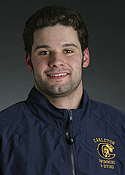I had the privilege of meeting Ted at the beginning of spring term 2006, when he enrolled in my course, Religion 221: Jesus, Paul, and Christian Origins (Introduction to New Testament). Early in the term, Ted came to my office hours to talk through his approach to the first paper--a close reading and textual analysis of a passage from the Gospel of Mark. Ted walked in wearing his baseball cap and a respectful, friendly smile. As he discussed his perspective on the passage, it became clear to me that he had done a thorough reading of all the suggested sources about the literary structure and historical context of Mark's gospel, and that he had arrived at his own original interpretation of the passage. (I believe Ted had chosen to write on the Feeding of the 5000.) This was the first time I had met Ted, and I didn't know exactly what to expect from his paper, but I assumed it would be solid. (Beyond that, I did not make any assumptions.) I was most struck, however, by Ted's personality. On the one hand, he seemed very unassuming: polite, respectful, unpretentious (even un-fancy), straight-forward. At the same time, he had an intensity and depth that were striking. One way of saying it is, perhaps, that he seemed very present, in a profound (yet utterly natural) way. When he was talking to you, he was completely engaged and focused. When he was reading a text, he seemed to give himself over to a full encounter with all the critical and creative questions and possibilities. And at the same time, he carried with him a sense of lightness, fun, and joy. When I received Ted's paper, I had one of those moments of recognition: Wow. This guy is so smart that it is a little uncanny. I would come to have this response to all of his papers, which were stunning. At this point, however, all of these thoughts were just loose impressions, as I had only known Ted for about 2 weeks.
But from then on, I began to glimpse a person who had a joy for learning and discovery, and whose intelligence combined critical engagement with compassion. From my first meeting with him, I had gathered that Ted had some kind of relationship to a Christian tradition, presumably Catholicism. While we never discussed this directly, I nevertheless came to see and to admire what I perceived as Ted's faith. Ted had a confidence that enabled him to contemplate any critical question and to articulate critiques of ancient and contemporary traditions and practices within Christianity. Yet, his critical perspectives also always spoke of a strong and mature commitment to tradition (with all its resources and all its flaws) and to community, and of a deep sense of compassion for those who were suffering and for the human being in everyone.
This latter trait--Ted's compassion for the "human being" in everyone--is what I have come to cherish about Ted, even though I did not know him for very long, or very well. He seemed to carry with him a love for himself and for others. This enabled him to be both humble and self-confident, and also genuinely accepting of other people. I feel very saddened by the loss of Ted and by the sorrow and grief of his friends and family, and I feel deep gratitude that I had the privilege of teaching him and of learning from him.

Add a comment